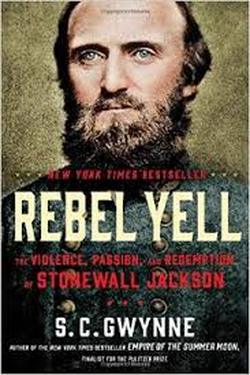
S.C. Gwynne
Scribner, 2014, 674 pp. + 14 pages introduction, $35.00
ISBN: 978-1-4516-7328-9
Image courtesy of amazon
When it comes to biographies on Stonewall Jackson, the usual standby is James Robertson’s Stonewall, but through the years there have been many others. This biography, Rebel Yell, attempts to be what all other Jackson biographies have done before: describe most of Jackson’s reasoning behind his thoughts of joining the Confederacy while detailing his life. Gwynne ‘s contribution to the American Civil War is worthwhile reading, but parts of it seem repetitive. While this book is a great introduction into the life of Jackson, the issue with this book is the attempt to compete with Robertson’s work and the constant comparison to the leviathan of a work which has preceded it.
S.C. Gwynne’s previous work, Empire of the Summer Moon, was a finalist for the Pulitzer Prize and the National Book Critics Circle Award. Most of his career has been spent in the field of journalism working previously with Time Magazine as the bureau chief, national correspondent and senior editor. He was also the executive editor of Texas Monthly. This book, Rebel Yell, is his first work on the American Civil War.
The biography of Jackson which Gwynne has presented thrives on the pacing of the work. Instead of outlining his life in order, Gwynne puts the people at Manassas in 1861 almost right away. This creates for the reader an idea of the name of Stonewall for not only Jackson but for the rest of his brigade. Due to the dearth of Manassas writings, this narrative is helpful to understanding what Jackson had done on those fields and how and why he deserved the name, though the name Stonewall is up for debate. As with most well written biographies, you also get short looks into the lives of the people around Jackson on both the Union and Confederate side of the conflict. The account of Jackson’s early life before the war is also detailed and is done with a good readable narrative though nothing new is presented in what is written. Every detail throughout the book has already been mentioned in a previous Jackson biography which is the main problem with this book. Looking into the bibliography, the general standbys were used when talking about Jackson causing confusion for me as to why this biography was written in the first place. Through all the issues which come with the lack of new information about Jackson, the book is quite readable and for those new to the study of the Civil War, this biography is a bit more accessible than others and much easier to handle.
I recommend this book only to people new into the realm of Civil War study and for those who want to learn about Stonewall Jackson. Gwynne thankfully avoids the discussions of “What If” that other biographers of Jackson have done in the past. The book is well sourced, but provides no new sources or new information to the well versed Civil War reader. My final thoughts on this book would be this: for those new to the study, I recommend this work as an introductory biography on Stonewall Jackson, but for those not new, tread lightly.
 RSS Feed
RSS Feed
